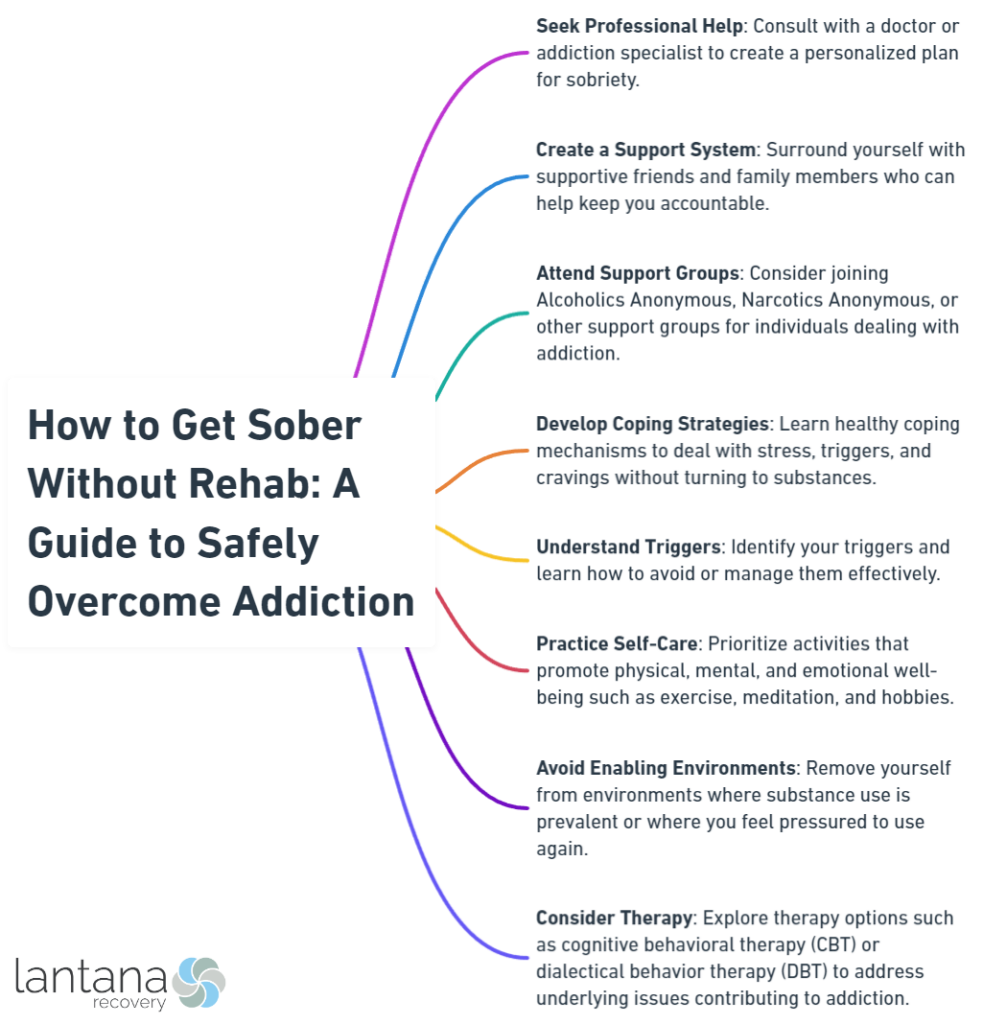Imagine overcoming addiction and achieving lasting sobriety without stepping foot in a rehab center. Is it possible? The answer is yes! With the right strategies, support, and determination, you can learn how to get sober without rehab. In this blog post, we’ll guide you through the process and share practical tips for creating a personalized recovery plan to achieve long-term sobriety.
Short Summary
- Overcome addiction safely and successfully without rehab by understanding personal reasons, developing strategies to overcome obstacles, and creating a strong support network.
- Motivate yourself with healthy habits such as exercise, nutrition & self-care for long-term sobriety.
- Regularly assess progress in recovery to stay motivated on your journey toward an addiction-free life!
Understanding the Challenges of Getting Sober Without Rehab

While alcohol rehab is a highly effective and structured approach to addiction recovery, not everyone has the means or desire to attend a rehab program or seek substance abuse treatment from institutions like Lantana Recovery. Personal reasons like financial constraints, fear of stigma, or lack of access to treatment may lead individuals to choose a different path toward sobriety.
However, getting sober without rehab comes with its own set of challenges, including managing withdrawal symptoms, addressing underlying issues, and creating a strong support network. But don’t worry, with the right mindset, resources, and determination, you can successfully overcome these obstacles and achieve lasting recovery.
Personal Reasons for Avoiding Rehab
Many individuals face personal reasons that hold them back from seeking rehab. Some common reasons include:
- Denial
- Shame
- Fear
- Concerns about treatment costs and health insurance
- Concerns about time commitment
These factors may hinder individuals from taking the first step toward addiction treatment for alcohol abuse.
Choosing to get sober without rehab allows individuals to bypass these obstacles while still working towards their goal of sobriety. Understanding the personal reasons for avoiding rehab can help motivate individuals to seek alternative paths to recovery. By addressing these factors, individuals can build confidence in their decision to get sober without rehab and gain a better understanding of their unique recovery journey.

Potential Obstacles in Self-Recovery
Self-recovery presents an opportunity to tackle withdrawal symptoms and explore underlying issues that need to be addressed. However, it’s important to recognize the challenges that may arise in the process. For those heavily addicted, the courageous step of getting sober on their own without medical assistance may lead to uncomfortable withdrawal symptoms. Moreover, drug cravings can be incredibly strong, and without the structure and support provided by a rehab program, staying sober can be an uphill battle.
Despite these challenges, self-recovery can be a rewarding and empowering experience. By identifying potential obstacles and developing strategies to overcome them, individuals can successfully navigate their path to sobriety and lay the foundation for a healthier, addiction-free life.
Strategies for Safe and Effective Detoxification at Home

Embarking on an at-home detox journey requires careful planning and preparation to ensure safety and success. Medical detox treatment and drug rehab programs provide clients with medication-assisted treatment to ease withdrawal symptoms. This makes the detox process more comfortable and safe, which increases the chances of success for individuals.
By seeking professional help and guidance, you can create a safe and effective detoxification plan tailored to your unique needs and circumstances.
Consult a Healthcare Professional

Before starting an at-home detox, it’s crucial to consult a healthcare professional to ensure your safety and maximize the benefits of your alcohol detox plan. Quitting cold turkey can be dangerous, and it’s essential to detox in a medical facility or under the supervision of a healthcare professional for your safety. Hospitalization or other forms of 24-hour medical care are the optimal choice for people withdrawing from alcohol.
By consulting a healthcare professional at an expert rehab center like Lantana in Columbia, SC, you can receive valuable advice and guidance on how to safely detox at home. This can include information on medications to ease withdrawal symptoms, strategies to cope with cravings, and resources to support your recovery journey.
Create a Safe and Supportive Environment
A safe and supportive environment is crucial for a successful at-home detox. To create a nurturing space, you can:
- Develop a group agreement
- Set clear expectations
- Provide emotional support
- Design the physical space
- Label materials and make them accessible
These steps can help ensure a comfortable and organized environment. Moreover, avoiding judgment and bias, providing emotional support, and building positive relationships can foster a safe and supportive atmosphere.
Additionally, to support your recovery and minimize the risk of relapse, it is important to:
- Steer clear of places, people, and activities that may trigger cravings.
- Reach out to family and friends for support.
- Join support groups for guidance and encouragement.
- Take advantage of online resources for additional support.
By creating a safe and supportive environment, you can focus on your recovery and minimize the risk of relapse.
Monitor and Manage Withdrawal Symptoms
During at-home detox, it’s vital to monitor and manage withdrawal symptoms closely. Here are some important steps to take.
- Medical detox is the safest and most comfortable way to manage withdrawal. Consult with a healthcare professional to determine the best course of action.
- Certain medications can be used to treat different types of withdrawal. Again, consult with a healthcare professional to determine the appropriate medication for your situation.
- Psychotherapy can help treat substance use disorder and any other co-occurring mental health conditions. Consider seeking therapy or counseling to support your detox journey.
To ensure a successful detox, be aware of your symptoms and seek professional help when needed, especially in cases of life-threatening withdrawal symptoms. By closely monitoring your severe withdrawal symptoms and addressing any complications, you can significantly increase your chances of a successful and safe detoxification process.
Building a Strong Support Network

A strong support network is vital in achieving sobriety without rehab. With the encouragement and guidance of those around you, you can navigate the challenges of sobriety and work towards your recovery goals.
In this section, we will discuss how to engage family and friends, join support groups, and utilize online resources to build a robust support network that can help you achieve and maintain long-term sobriety.
Engaging Family and Friends
Family and friends play a crucial role in supporting addiction recovery. They can provide emotional backing, inspiration, and encouragement throughout your journey to sobriety. To involve them in your recovery process, consider:
- Attending support groups together
- Researching and finding treatment options, including family therapy
- Providing pertinent information about your life and substance use to treatment professionals
- Sharing your feelings with them
By engaging family and friends in your recovery, you can create a powerful support system that can help you stay focused, motivated, and accountable. With their help, you can face the challenges of addiction and work towards a brighter, addiction-free future.
Joining Support Groups
Support groups, such as Alcoholics Anonymous (AA) and SMART Recovery, provide a sense of togetherness and accountability that can be incredibly beneficial in maintaining sobriety. These groups offer guidance, motivation, and a safe space to share experiences and challenges with others who understand the struggles of alcohol addiction.
By attending support group meetings, you can learn valuable coping skills, build your confidence, and stay inspired in your recovery journey. With the help of a supportive community, you can continue to grow and thrive in your newfound sobriety.
For instance, a study has found that “peer support workers acknowledge the ebb and flow of growth in different seasons and embrace these seasons as significant milestones on the journeys of homeless youths. These findings can offer valuable insights to service providers implementing peer programs or developing engagement models for supporting homeless young individuals in their growth through relationship-based approaches” (How do peer support workers value self-directed growth, Erangey et al., 2021.)
Utilizing Online Resources
In today’s digital age, there are countless online resources available to help you on your journey to sobriety. Websites, apps, forums, and blogs offer valuable information, guidance, and support for individuals struggling with addiction. Some helpful online resources for detoxification and recovery include:
- SAMHSA’s National Helpline
- Substance Use Resource Center
- I Am Sober app
- Sober Grid app
By utilizing online resources, you can access a wealth of knowledge and support from the comfort of your own home. These resources can provide you with the tools and guidance necessary to stay on track with your sobriety goals and overcome any obstacles along the way.
Addressing Underlying Causes of Addiction

To achieve long-term recovery, it’s essential to address the root causes of addiction. Uncovering these underlying causes empowers you to create a healthier life and sustain lasting sobriety.
In this section, we’ll delve into strategies for identifying triggers, developing healthy coping mechanisms, and seeking therapy or counseling to address these underlying issues without the need for rehab.
Identifying Triggers and Coping Mechanisms
Recognizing your triggers and developing healthy coping mechanisms are crucial steps in addressing the underlying causes of addiction. Being mindful of intense emotional reactions and physical signs of stress can help you identify your triggers. Once you’ve identified your triggers, you can develop healthy coping mechanisms such as deep breathing, expressive writing, and communicating your feelings.
By understanding your triggers and cultivating effective coping strategies, you can build a solid foundation for lasting recovery and stick to your reasons for staying sober. These skills will help you navigate challenging situations and avoid relapse, paving the way for a healthier, addiction-free life.
Seeking Therapy or Counseling
Therapy or counseling can be an incredibly empowering experience, providing a safe and supportive environment to explore your thoughts and emotions, develop valuable coping skills, and improve your overall well-being. Accessible options such as teletherapy and online counseling offer the convenience and flexibility needed for those seeking help without attending a rehab center.
By engaging in therapy or counseling, you can:
- Address the root causes of your addiction
- Gain valuable insights into your recovery journey
- Develop the skills and strategies needed to maintain long-term sobriety
- Live a fulfilling, addiction-free life
With the help of a trained professional, you can achieve these goals.
Developing a Personalized Recovery Plan

Creating a personalized recovery plan is key to achieving and maintaining sobriety without rehab. Here are the steps to follow.
- Set achievable goals.
- Devise a plan to reach those goals.
- Monitor your progress. By following these steps, you can stay focused and motivated throughout your journey to sobriety.
In this section, we’ll discuss setting realistic goals, incorporating healthy habits, and regularly assessing your progress to create a personalized recovery plan tailored to your unique needs and circumstances.
Setting Realistic Goals
Setting realistic goals is essential for staying motivated and focused on your end goal. By following these steps, you can ensure your goals are achievable and aligned with your recovery journey.
- Write down your goals.
- Make them SMART (Specific, Measurable, Achievable, Relevant, and Time-bound).
- Use incentives and accountability to help you stay on track.
Some examples of realistic goals to set for yourself include attending a support group meeting once a week, going to therapy sessions twice a month, or abstaining from drugs or alcohol for a certain period of time. By setting achievable goals and working towards them, you can build confidence in your ability to overcome addiction and maintain long-term sobriety.
Incorporating Healthy Habits
Healthy habits play a crucial role in supporting long-term recovery. Some examples of healthy habits to cultivate include:
- Exercise
- Healthy eating
- Getting enough sleep
- Filling your time constructively
- Practicing self-care
- Taking up new hobbies
These habits not only offer structure and purpose but also help manage cravings and provide a distraction from unhealthy behaviors.
By incorporating healthy habits into your daily routine, you can create a strong foundation for lasting recovery. These habits will not only support your physical and mental well-being but also empower you to lead a fulfilling, addiction-free life.
Regularly Assessing Progress
Consistently assessing your progress in recovery is crucial for making necessary changes and ensuring lasting sobriety. Some effective ways to measure progress in addiction recovery include utilizing standardized scales, tracking changes in behavior, and engaging in self-reflection.
By regularly evaluating your progress and making adjustments as needed, you can stay motivated and focused on your recovery goals. This ongoing assessment will help you identify areas of improvement and celebrate your successes, ultimately leading to a healthier, addiction-free life.
Summary
Achieving and maintaining sobriety without rehab is possible with the right strategies, support, and determination. By understanding the challenges of getting sober without rehab, creating a safe and effective detox plan, building a strong support network, addressing underlying causes of addiction, and developing a personalized recovery plan, you can successfully overcome addiction and live a fulfilling, addiction-free life. Remember, the journey to sobriety is unique for each individual, but with the right tools and resources, you can achieve lasting recovery and enjoy the incredible benefits of a sober lifestyle.
Frequently Asked Questions
How do I motivate myself to get sober?
Reach out to your support network, set realistic goals, find healthy coping strategies, talk about it, and identify what inspires you – these are the keys to motivating yourself to stay sober.
Taking the time to focus on yourself and your recovery is essential. Developing a plan that works for you and your lifestyle is the best way to stay on track. Make sure to include activities that bring you joy and help you stay connected to your support system.
Why can I not be sober?
Coming to terms with a substance use disorder can be difficult, but it is necessary to seek professional treatment in order to achieve sobriety. Addiction and denial often go together, making it harder to accept the need for help.
How can I safely detox from drugs or alcohol at home?
Consult a healthcare professional for guidance, create a safe and supportive environment, and closely monitor and manage withdrawal symptoms – these steps can help you safely detox from drugs or alcohol at home.
Detoxing from drugs or alcohol can be a difficult process, but with the right guidance and support, it can be done safely at home. Taking the time to research and understand the process, as well as consulting a healthcare professional for guidance, can help ensure a successful outcome.
What are the benefits of joining support groups for maintaining sobriety?
Support groups provide invaluable motivation and guidance, enabling individuals to stay on track with their sobriety journey while creating a safe environment to share experiences with like-minded peers.
How can I address the root causes of my addiction?
Take steps to identify and address underlying issues related to addiction, such as finding healthy coping mechanisms and considering therapy or counseling. With the right support, you can tackle the root causes of your addiction.









